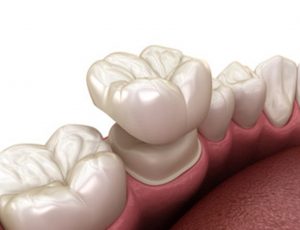
Dental crowns are among the most effective means of restoring damaged or compromised teeth—however, even though they’re meant to help, some patients feel apathetic about receiving them, mostly due to concerns about pain. But if you’re slated to receive a crown, you have nothing to worry about; getting them is relatively painless and quite straightforward. Keep reading to learn more about dental crowns, including their many uses and what your dentist will do to ensure your comfort while you receive yours.
What Are Dental Crowns Used For?
In short, dental crowns are protective caps for your teeth. They act as special coats of armor that protect your teeth above the gumline, safely sealing them inside and protecting their precious enamel from all sorts of threats. They have several different applications including:
- Protecting damaged, fractured, or decayed teeth.
- Covering a misshapen or discolored tooth.
- Preserving a tooth that’s undergone root canal therapy.
- Securing a dental bridge.
- Protecting a dental implant.
Does It Hurt to Get a Crown?
Typically, it takes two appointments to receive a dental crown; but you shouldn’t expect any pain during either one of these visits! While you might experience some mild sensitivity, your dentist will give you an anesthetic like they would with a filling. They can even apply a jelly that numbs the skin around the anesthetic injection site. Same-day crowns are an option in some instances, with the help of special technology—but these solutions are also pain-free.
You might experience minor pain and tenderness in the affected area after receiving your crown, but this is your body’s natural response to the procedure and will dissipate within a week or so. This soreness can also stem from the anesthetic injection site, rather than the actual crown; but over-the-counter pain medication can usually address this.
In some cases, you might also develop painful problems from failing to properly care for your crown after receiving it. Oral bacteria can easily grow inside the crown and also around it, which can lead to infection that compromises the surrounding teeth and gum tissue. Needless to say, brushing and flossing diligently can actively mitigate this and ensure the crown’s integrity moving forward.
If your dentist has informed you that a crown is necessary to assist your oral issue, you have nothing to worry about; it’s a relatively pain-free option that is certain to get your smile back on track.
About the Practice
The team at Smile Fitness Dental Center is proud to serve the dental needs of patients and families in Phoenix under the leadership of four skilled specialists: Dr. Douglas Gordon, Dr. Bernard Florento, Dr. Melina Ghods, and Dr. Joseph Santoro. Their practice is pleased to offer several available services including restorative options like dental crowns. If you have any questions about crowns or need to schedule a visit, feel free to reach out online or over the phone for assistance: (623) 849-0477.
